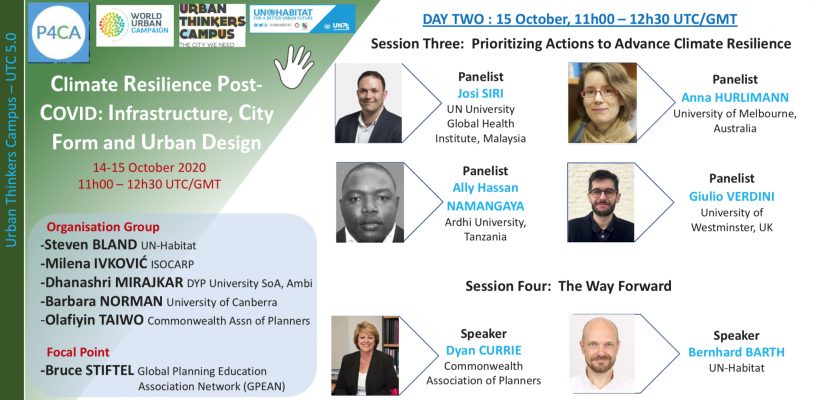Planners for Climate Action (P4CA) hosted a two day Urban Thinkers Campus on 14th and 15th October 2020, titled Climate Resilience Post-COVID: infrastructure, city form and urban design, 11h00 – 12h30 UTC/GMT, in partnership with UN-HABITAT, World Urban Campaign, ISOCARP, Commonwealth Association of Planners, AESOP, ACSP, GPN.
Programme (see the list of speakers): Progress toward SDG11 and SDG13 has slowed as a result of COVID, but the urgency of global climate targets remains. Both COVID and climate change are resilience threats, suggesting that to some extent the enormous global attention to COVID may have lessons for how to respond to climate change. Historic adaptations of cities in response to disease outbreaks offer important models. There is now the opportunity to reflect on ‘business as usual’ and consider how we can we develop actions that make for both a healthy and greener city with multiple benefits.
The aim of this Urban Thinkers Campus is to consider and recommend innovative positive actions by City Planners with specific targets in the immediate and longer term providing pathway for more sustainable urban settlements in the future.
We had the possibility to show our research and a paper titled: ‘Globally-informed City Climate Pedagogy & Practice – Actions to advance climate resiliency’, Giulio Verdini, University of Westminster (Panelist of the session: Prioritizing Actions to Advance Climate Resilience, 15th October 2020)
How to cite: Verdini, G. (2020), Globally-informed City Climate Pedagogy & Practice. Actions to advance climate resiliency, Paper presented a the Urban Thinkers Campus, Climate Resilience Post-COVID: Infrastructure, City Form and Urban Design, 15th October 2020. Available at: https://blog.westminster.ac.uk/ccpp/
This presentation is about the nexus between cities, climate-resilience and the current pandemic situation, and how they might impact in urban pedagogy and practice. It shows some preliminary results of a research we have conducted over the last few months titled ‘globally-informed city climate pedagogy and practice’. This research was set up in the pre-COVID period, with the aim to revise some pedagogical assumptions in light of global challenges, so I will eventually discuss some of its findings in light of the pandemic.
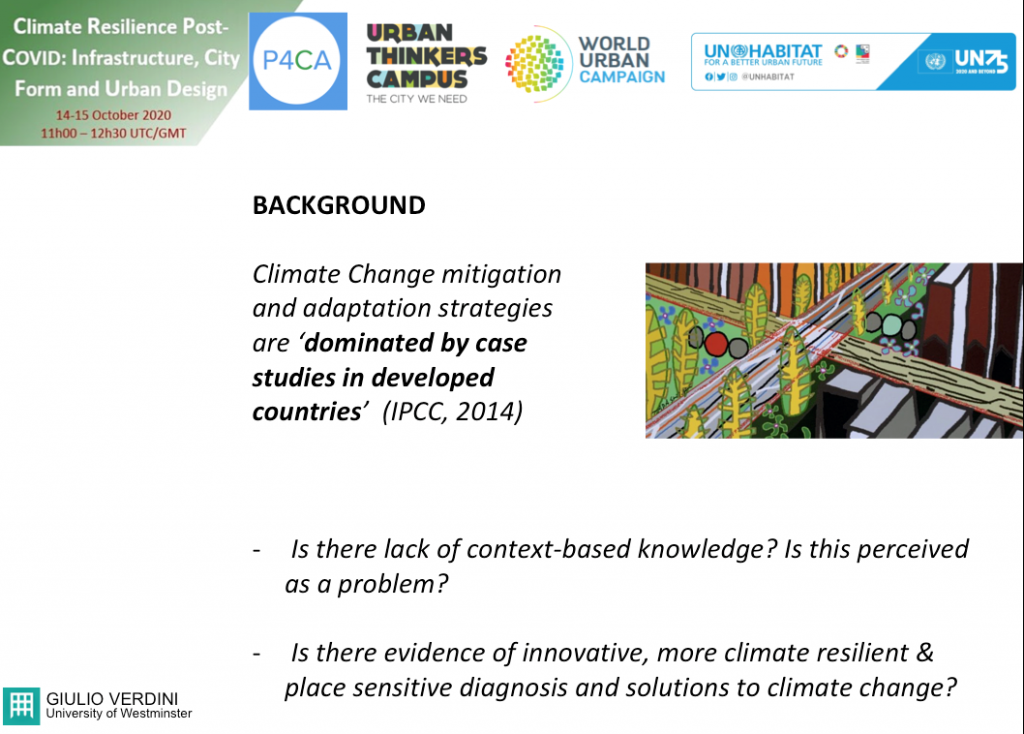
The starting point of the research, as stated in our position paper, is the fact that ‘urban and architectural knowledge available has been predominantly produced in the West, and, more critically, used in Global South cities where most of the urbanisation is today occurring. This comes from the latest comprehensive assessment report of the Intergovernmental Panel on Climate Change (IPCC, 2014), that recognized in particular that ‘existing literature on urban form and infrastructures as drivers of GHG emissions and therefore CC mitigations and adaptations strategies are ‘dominated by case studies of cities in developed countries’.
For this reason, and assuming a perspective we refer to the ‘decolonisation of knowledge’, we have conducted further research, including interviewing experts operating in the Global South, and working between academia and practice. The aim was to understand:
- Whether there is a lack of context-based knowledge in the place where they operate, and if this is perceived as a problem (evident failures);
- Whether there is evidence of innovative, more climate resilient and place sensitive diagnosis and solutions to climate change problems in the place where they operate.
The ultimate goal of this is to understand how we achieve what we have called an effective and globally informed city climate pedagogy & practice, by improving the system of knowledge production (we refer to both academic and professional bodies institutions and their role to develop educational, life-long, and capacity building programmes).
1/ What do you see as the most urgent topic where action for climate resilience is needed?
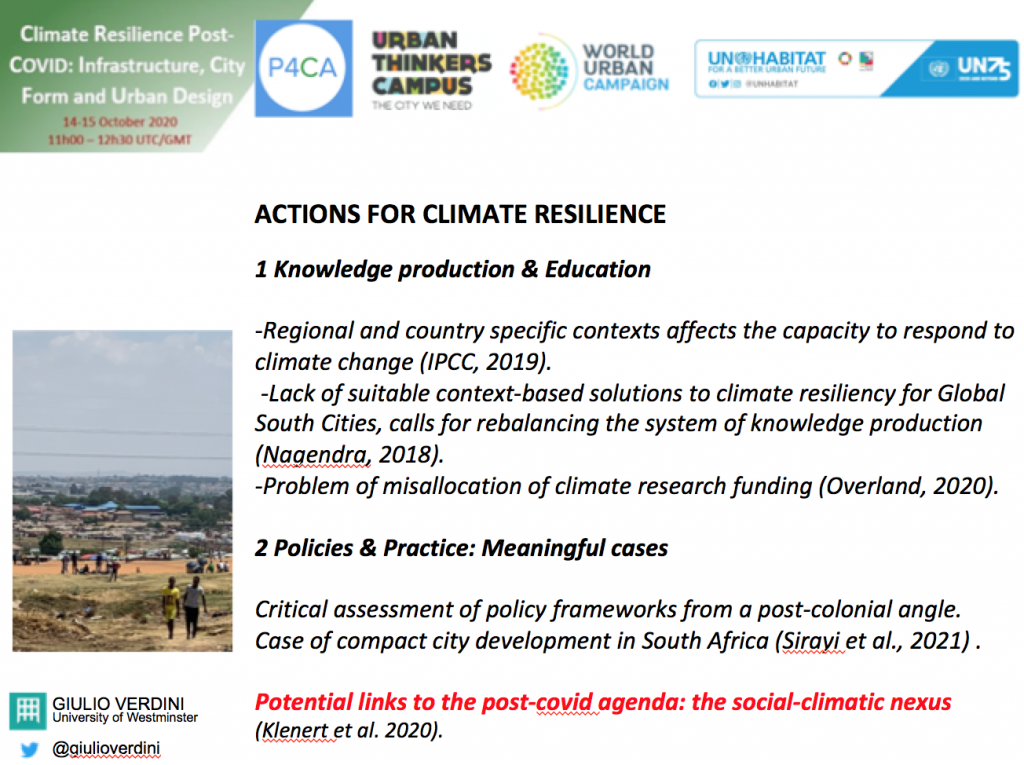
In terms of knowledge and education, given the premises of this research, the main point I would like to make is that there is general lack of suitable context-based examples (solutions to climate resiliency) for the Global South. The technical summary of the current IPCC review (that will be fully published in 2022) states that: ‘regional and country specific contexts affects the capacity to respond to climate change’ and this depends ‘on differences in socio-economic conditions, wealth, degree of industrialization, institutions and governance’ (p.’43). This points to the risk of easy transfer of knowledge, and at the same time it recognizes the important of tapping into both scientific innovation and local cultural and indigenous knowledge.
However, overall, the situation is better than few years ago (for example south-to-south learning is improving and new countries are becoming models: see China for what concerns some solutions to climate adaptations – i.e. ‘the sponge city’, and the famous case of the BRT system in Curitiba, Brazil, which has spread all over China and beyond). Nevertheless, there is a need to make further efforts in funding and publishing research from the Global South, south-to-south cooperation and rebalancing the available knowledge (Nagendra et al., 2018). There is also a question of ‘misallocation of climate research funding’ (Overland et al., 2020), disproportionately towards natural and technical science rather than the social science. Again this might lead to a lack of understanding of local socio-economic and institutional contexts, and it is therefore very relevant for policy transfer to Global South.
In terms of policies and practice, to enhance our set of good practice and examples, there is the need of strengthening the critical assessment of policy frameworks in Global South contexts, assuming a more explicit de-colonial perspective. This is crucial when Western examples are explicitly mentioned. As an example in this respect I would refer to a case in South Africa, where national policies are advocating for compact city development and transit-oriented development. In a recent assessment, this is seen largely in risk of reinforcing inequality with limited impact on mitigating CC, leading to advocate to shift the policy attention to reinforce urban-rural linkages, mobility for low income groups, indigenous knowledge systems and rural revitalization (Sirayi et al, 2021).
The environmental and social nexus of such policies is even more relevant now, in light of the pandemic situation. There is the need to address ‘distributive concerns alongside mitigation measures’ (Klenert et al. 2020, p.769), as the costs of global problems (such as COVID and climate change) might be disproportionate on developing countries and low-income households.
In climate resilient cities post-covid we need to look more systematically at trade off between climate mitigations and adaptations, and social impacts, if we want to achieve city resiliency!
2/ What is the current awareness on the problem of climate resilience in the city / region you are professionally involved with or researching?
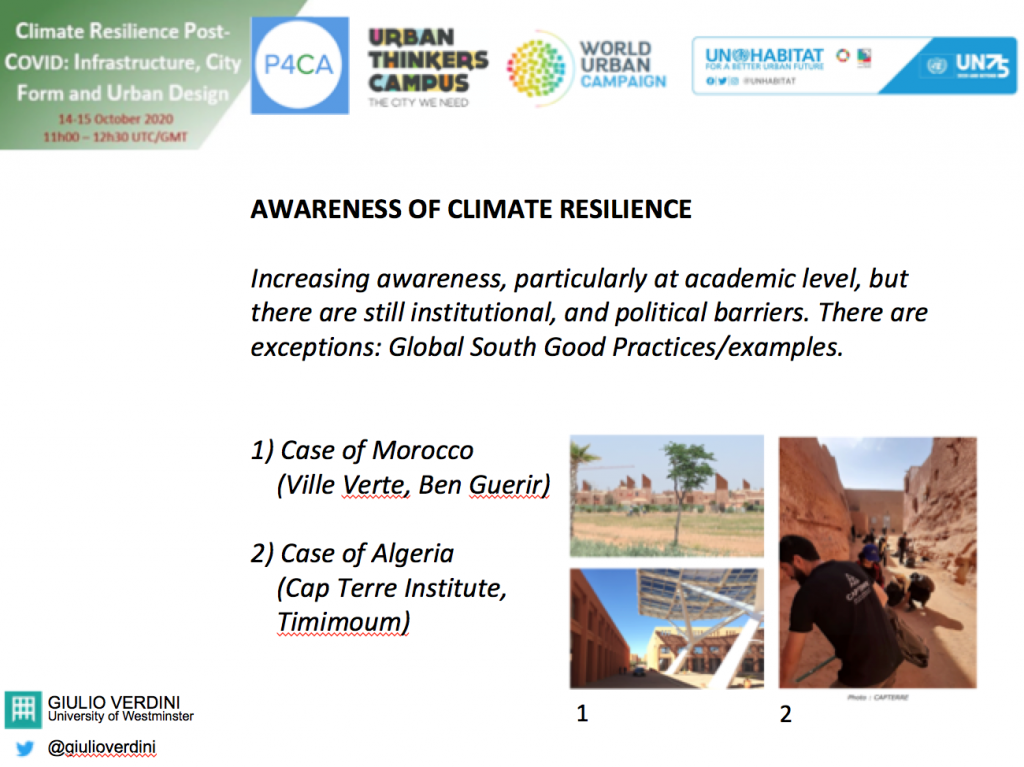
Regarding this second point, the results of the research we implemented showed a variety of responses. To put it shortly, there is an increasing awareness of climate change problems with lots of innovation taking place particularly at the academic level. Usual barriers are identified such as the lack of interdisciplinarty and the silos mentality. However, there are still barriers at the city/regional and institutional level. Some good practices show the importance of national initiatives to steer sustainable development practices in Global South Cities.
One is the case of the Green City of Ben Guerir, in Morocco, North of Marrakesh, which has received large public funding to set up a new knowledge hub, with programmes to study sustainability, and living labs to test energy-saving building techniques.
Another very different case is the Centre for the protection of cultural heritage in Algeria, called Cap-Terre, which aims to support and disseminate the use of earth as a construction material. Through collaboration with local Universities, they protect their heritage by promoting heat reduction and comfort of living in overheated environments.
3/ Which stakeholders are crucial for enabling more action for climate resilience? How should they collaborate?
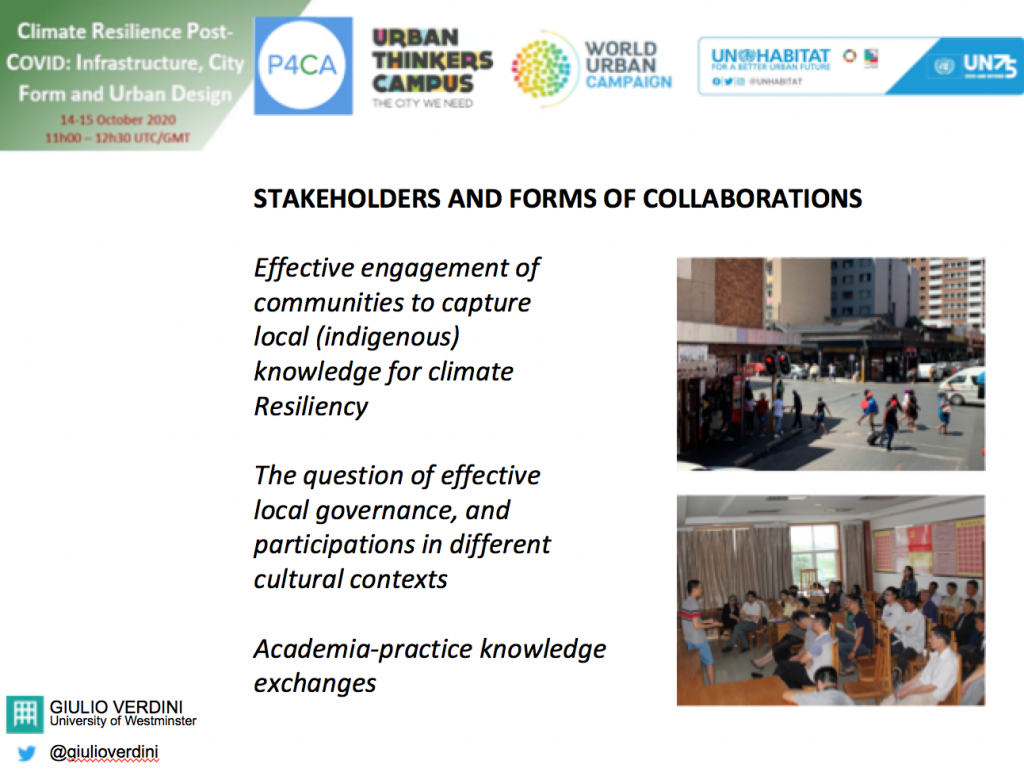
These two cases bring me to the third question on which stakeholders are crucial for enabling more effective actions for climate change and how they should collaborate. Climate mitigation and adaptations measures in Global South cities are still primarily driven by governments, with the contribution of international financial institutions and often foreign consultancy companies. This is evident. However, it is crucial that regional and municipal governments, local communities of practice, and communities in general are empowered and better included in the co-production of knowledge and actions for sustainable urban transformation. Academia can play a role (see the example of living lab set up in Morocco around the green city). The goal is to capture local (or even indigenous) knowledge to promote sustainable cities. This is for example the case of culture-led smart villages in South Africa or integrated water urbanism in the Jiangsu province. The question here still open for discussion is how to engage such ‘stakeholders’ more efficiently. There are huge variations across countries: from China, where the system responds strictly to hierarchies, and representation is mediated through various administrative levels, to Africa where disenfranchised communities do not generally take part in decision-making processes. Therefore, advocacy for a generic community engagement might be quite problematic and needs to be specified.
In summary: a globally informed city climate pedagogy and practices implies to innovate our programmes including a variety or diverse perspectives (decolonisization of knowledge) and redrawing a set of case studies (good examples or failure) where it is questioned the condition for the transferability of knowledge from the North to the South.
List of references
- IPCC (2014), Chapter 8: Urban Areas. In: Climate change 2014: impacts, adaptation, and vulnerability. Working Group II contribution to the fifth assessment report of the Intergovernmental Panel on Climate Change. New York, NY: Cambridge University Press.
- IPCC (2019), Technical Summary. In: Climate Change and Land: IPCC special report on climate change, desertification, land degradation, sustainable land management, food security, and greenhouse gas fluxes in terrestrial ecosystems, In Press.
- Klenert et al. (2020), Five Lessons from COVID‑19 for Advancing Climate Change Mitigation, Environmental and Resource Economics (2020) 76:751–778.
- Nagendra, H. et al. (2018), The urban south and the predicament of global sustainability, Nature Sustainability, 1, 341- 349.
- Overland et al., (2020), The misallocation of climate research funding, Energy Research & Social Science, 62.
- Sirayi, M., Kanyane, M., Verdini, G. (2021), Culture and Rural-Urban Revitalization in South Africa: Indigenous Knowledge, Policies and Planning, Routledge: London.
- CLIMATE JUSTICE & CITIES - March 1, 2022
- ALL4CLIMATE #MILAN PRE-COP26 - October 14, 2021
- PODCAST #4: UNIVERSITIES AS LEADERS IN SUSTAINABILITY, FIGHTING CLIMATE CHANGE - February 26, 2021
